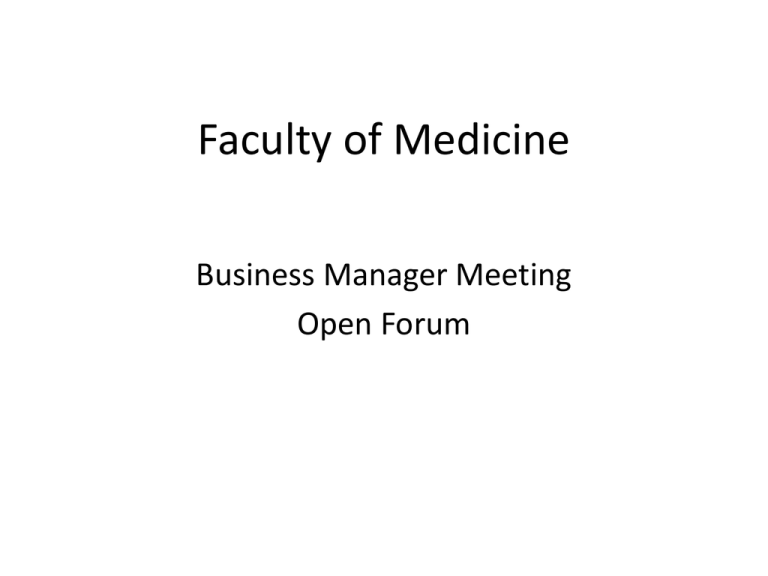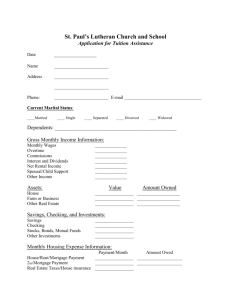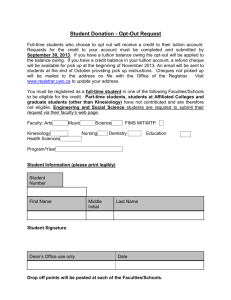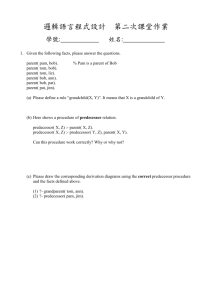Faculty of Medicine - University of Manitoba
advertisement

Faculty of Medicine Business Manager Meeting Open Forum Today’s Agenda 1. Operating Cash Flow – expectations 2. Capital Projects – setting up capital accounts, transferring funds, time lines 3. MB Health cash flow requirements 4. Predecessor Funds (Source of Funds) – what are they 5. Deposits to expense lines 6. Open forum discussion Cash Flow Expectations • Please make sure your forecast is as accurate as possible. • If you are going to have a surplus, the Dean needs to know. • If you are going to over expend your FOP, you need to know. • Any surplus in the 110000 Fund will be caught up in carry over. Any deficit will come back to the department at 100%. Capital Projects • Departments must identify Capital Projects early- by September • Start with email to SFO listing funding source, project scope, time line. We will assist in setting up the capital fund • Capital funds are carried over at 100% but must be set up early in the fiscal year. • If you are contacting Physical Plant, keep all documentation related to time lines and commitments. • Jonathan Hyman, Assistant Manager, Capital Revenue, Capital and General Accounting – Sets up the capital fund – Tracks expenses – Monitors the progress – Will contact SFO if project goes over budget • Any transfers from operating require approval from Joanne Dyer, University Budget Officer or Tom Hay, University Comptroller. • Departments are responsible for any projects that go over budget. Manitoba Health Reporting • Why: • MB Health requirement • Dean needs to know how you are spending the MB Health funds • How: • Departments will run the Revenue and Expenditure Statement report in FAST for FUND 12101 • We will require a separate report for each use of the MB Health Funding. • • • • IMG NP Increased Enrolment Phase 1 and 2 Other • Submit your quarterly report to Nashon. • Due dates are based on the 2009/2010 Monthly Cut-off schedule as set by Financial Services. • July 15, Oct 15, Jan 15 and April 20 The University of Manitoba - Faculty of Medicine - Department of XXXXXXXX Quarterly Reporting As at June 30, 2009 April to June July to Sept Oct to Dec Total Outstanding Jan to Mar Actuals Actuals Actuals Actuals Commitments Projected Totals Salary Expenditures Academic Staff 100,000.00 100,000.00 - 200,000.00 200,000.00 - 400,000.00 Support Staff 50,000.00 50,000.00 - 100,000.00 100,000.00 - 200,000.00 Benefits & Levy 10,000.00 1,000.00 - 11,000.00 4,000.00 - 15,000.00 160,000.00 151,000.00 - 311,000.00 304,000.00 - 615,000.00 10,000.00 5,000.00 - 15,000.00 - - 15,000.00 Total Salary Expenditures Non-Salary Expenditures Travel Printing and Duplicating 500.00 450.00 - 950.00 - - 950.00 Other Materials and Supplies 1,000.00 1,000.00 - 2,000.00 - - 2,000.00 Telecommunications 1,000.00 1,000.00 - 2,000.00 - - 2,000.00 Other Operational Expenses 1,000.00 1,000.00 - 2,000.00 - - 2,000.00 Externally Contracted Services 1,000.00 1,000.00 - 2,000.00 - - 2,000.00 Professional Fees 1,000.00 1,000.00 - 2,000.00 - 22,000.00 Capital Asset Acquisitions 1,000.00 - 1,000.00 - 1,000.00 Repairs and Maintenance 1,000.00 1,000.00 - 2,000.00 5,000.00 - 7,000.00 17,500.00 11,450.00 - 28,950.00 25,000.00 - 53,950.00 Total Non Salary Expenditures - 20,000.00 - Total Salary and Non Salary Expenditures 177,500.00 162,450.00 - 339,950.00 329,000.00 - 668,950.00 Fund Accounting • Method used by non profit organizations and the public sector • Accountability is measured rather than profitability • Main focus is to keep track of resources that are designated for specific purposes; to avoid mixing up resources that are intended for diverse purposes • Ensures management fulfills the stewardship responsibility for proper disposition of the resources Fund Accounting Example • Each fund further segregated for stewardship purposes – Research Fund Example Research Fund Federal Government NSERC Grants SSHRC Grants Provincial Government Dept of Agriculture MB Conservation Why Fund Accounting? • By recording and reporting resources in this manner, we are better able to: • Identify and document if resources are being used properly • Determine our condition on a fund by fund basis • Plan, budget and later evaluate if we are accomplishing objectives • Communicate financial information to all who need to know Why Fund Accounting? • Answers the following: • Do we have money to spend? …. Important information for faculties and units • Are funds being used appropriately? … Financial Services needs to know • Have University guidelines been followed? … Internal Audit needs to know • Are funds being used for the defined purpose given? … Important information to granting agencies Why Fund Accounting? • Answers the following questions: • Has the University utilized public funds (tax dollars) in an appropriate manner? …. Important information for federal and provincial governments • Did the University provide the goods and or services expected within budget? … Industry partners want to know Why the Separation of Funds? vs. Why the Separation of Funds? • Better manage budgets • Understand how the University’s operating activities are funded • Know what needs to be cut in case of downsizing or a stop in funding from external sources • Facilitate accountability to funding providers Operating Fund Hierarchy • Comprised of two revenue sources 1. Primary Sources – COPSE & Tuition 2. Secondary Sources (multiple) • Levels of the Fund Hierarchy represent the 2 main categories / revenue sources • Main Levels are called Fund Types 1. Unrestricted Operating Funds (Fund Type 01) 2. Internally Restricted Operating Funds (Fund Type 11) Operating Fund Hierarchy Fund Type 10 General Funds Fund Type 01 Fund Type 11 Unrestricted Funds Internally Restricted Funds (Primary Sources) (Secondary Sources) Operating Fund Hierarchy • Various levels of the hierarchy are called levels or predecessors General Funds Type 10 Fund Type Unrestricted Funds Type 01 Predecessor Level Predecessor Level Unrestricted Operating Fnds 110 Individual Allocation Funds 1240 Start Up Research 12400 “Startup – Example” 12xxxx Predecessor Level Predecessor Level Data Entry Level Unrestricted Operating Fund Fund Type 10 Fund Predecessor Fund Predecessor Description Allocation & Administration Revenue Source 01 11000 General Operating Allocation RCGA, B&G 11100 Tuition RCGA COPSE Operating Revenue (Overhead, Investment, Miscellaneous) Tuition Revenue 12400 Start Up Research Units & Faculties Operating, COPSE & Tuition Revenue 12500 Overhead B&G Reserves (Central Administration – Account 711105) 12600 Other Allocations & Projects B&G Operating, COPSE & Tuition Revenue 12601 Research Matching B&G Operating revenue 12650 VP (Acad) Projects B&G COPSE, Operating & Tuition Revenue B&G COPSE Access B&G COPSE B&G Reserves (Central Administration – Account 797010) 12103 12107 12700 12900 12970 Targeted COPSE ACCESS Targeted COPSE Projects Pooled & Individual Travel & Exp Operating Research Grants Operating Research Development VP (Research), B&G VP (Research), B&G Operating, COPSE & Tuition Revenue Operating, COPSE & Tuition Revenue Internally Restricted Operating Fund Fund Type Fund Predecessor Fund Predecessor Description Allocation & Administration 12100 Targeted Other Federal Projects Units & Faculties Federal Contract Revenue 567000-567006 12101 Targeted Provincial Projects Units & Faculties Provincial Grant Revenue Provincial Contract Revenue 564001-564009 568001-568010 12102 Targeted Industry Units & Faculties Other Contracts 569001-569014 12105 Targeted Misc Fnds Assoc's Grants Units & Faculties Other Grants 566001-566998 12104 Targeted Indirect Cost of Res (IMS - 613) VP (Research) 12200 Income Funded Projects Units & Faculties 12300 Transfers from Trust & Endowment 12800 Gifts for Operating Revenue Source Revenue Account Range 10 11 Trust & Endowment Units & Faculties Social Sciences and Humanities Research N/A Council of Canada (SSHRC) External Sales & Service Income 520001-524905 Internal Sales & Service 530001-534951 Income Transfers in from Trust 820002 Gifts & Contributions Gifts to Operating 540001-541000 589001 Finding the Predecessor Code • Utilize the Operating Fund Hierarchy website available online – Aurora Finance Chart of Accounts webpage www.umanitoba.ca/computing/renewal/aurora/finance/aca/coa • Utilize FTMFUND in Banner 1. 2. 3. 4. Enter Query Type Fund code in Fund: field Execute Query …Predecessor Fund is listed Deposits To Expense Lines • There should be NO deposits to expense lines at all. The reasoning behind this is that we don’t want to get to the end of the year and have a credit balance sitting in an expense line account. • For deposits that would have been reimbursing an expense on a 110000 fund (or any unrestricted fund), this should get deposited to the specific departments cost recovery fund (we can set new ones up if each department doesn’t have a cost recovery fund) and the expense would be transferred from the unrestricted fund to the cost recovery fund. • For restricted funds, again nothing is deposited to an expense account line. Rather it should be deposited to a revenue cost recovery account line and the expense will be sitting on the appropriate expense line which in theory nets out to zero.







